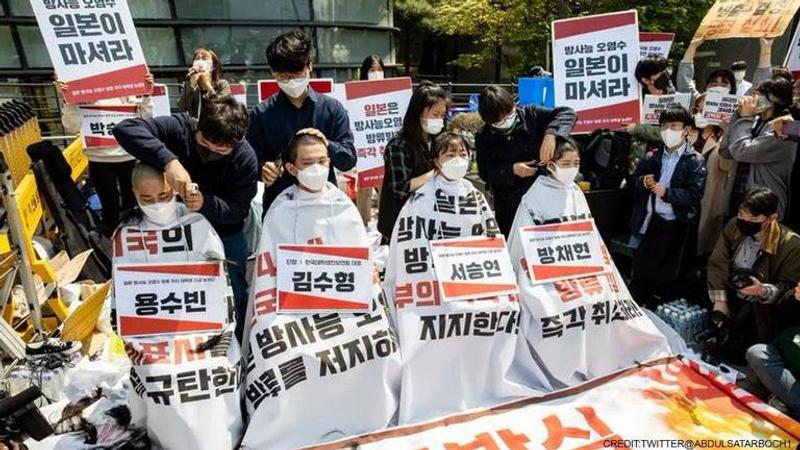Published 20:25 IST, April 22nd 2021
South Korean students shave heads to protest against Japan's Fukushima water release plan
Over 30 college students in South Korea shaved their heads in front of Japanese embassy to protest against Tokyo’s plan to release treated radioactive water.

More than 30 college students in South Korea have shaved their heads in front of the Japanese embassy in Seoul to protest against Tokyo’s plan to release more than a million tonnes of treated radioactive water from the wrecked Fukushima nuclear plant into the Pacific Ocean. As reported by CNA, the images and videos showed students sitting with banners opposing Japan’s move. The demonstration that took place this week, was allowed by the South Korean government despite the COVID-19 pandemic.
Reportedly, the South Korean protesters also said that Tokyo’s move could lead to a ‘nuclear war’ after the Japanese government made the announcement on April 12 triggered a furious reaction from China along with the local fishing communities. However, Japan has already said that the process of releasing the treated water won’t take place for at least two years and would further take decades to complete.
One of the protesters said in a televised report, “It was not an easy decision to shave our heads. But we wanted to show our will to stop the contaminated water release. And this can be a problem if the United States continues to support Japan’s decision.”
Earlier, US climate envoy John Kerry on April 18 said that he believed Japan made the decision regarding treated nuclear water in a transparent manner and said Washington would continue to follow Tokyo’s due procedures. Meanwhile. Seoul has strongly rejected the decision. The South Korean foreign ministry even summoned Japanese envoy and President Moon Jae-in ordering officials to explore the available options to file a petition in an international court.
How contaminated is the water?
Following the Fukushima nuclear disaster in 2011, Japan had stored massive amounts of treated but still radioactive water in huge tanks after a massive earthquake and tsunami damaged the reactors in the plant and their cooling water became contaminated and began leaking.
The water, equivalent to about 500 Olympic-sized swimming pools, according to Plant operator Tokyo Electric Power Company Holdings Inc (Tepco) and the government is not harmful. The officials say that it is tritium which is not harmful in small amounts. Even though tritium cannot be removed from the water, all other radionuclides selected for the treatment can be reduced to safe levels before its release.
However, as per the Associated Press report, scientists have alerted that there would be a long-term impact on marine life due to the low-dose exposure from such large volumes of water remains unknown. A Scientific American article said in 2014 had said that tritium is considered to be relatively harmless because it does not emit enough energy to penetrate the human skin but added that it can raise cancer risks if ingested.
Image credits: @AbdulsatarBoch1/Twitter
Updated 20:25 IST, April 22nd 2021




